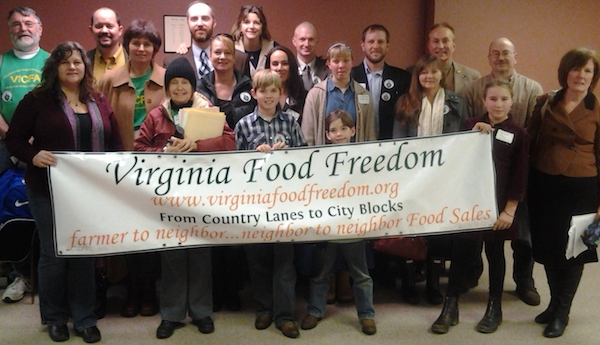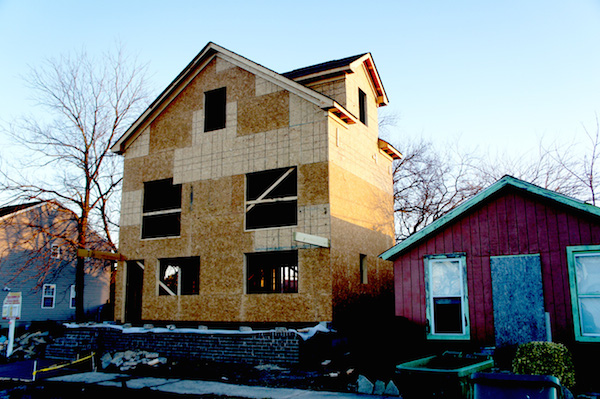FROZEN FOAM: A Walk on Cape Charles Beach

A wave is a fleeting thing — rushing onto the sandy beach only to disappear, sometimes leaving behind a foam mustache which also quickly vanishes. But not always! Sub-freezing temperatures this past week preserved the foam in place, and Kathleen Sabo captured it with her cell phone camera during her regular beach patrol to pick up trash. (Published February 9, 2015)
Fiery Retort to Official’s ‘Information Paper’ on Rezoning
CAPE CHARLES WAVE
February 9, 2015
An “Information Paper” by Northampton County Economic Development Director Charles McSwain is being fiercely challenged by the anti-rezoning group “Citizens for Open Government,” led by Exmore businessman Ken Dufty.
McSwain challenges “statements made in flyers over the past year” with a “point-by-point” response. Dufty, rising to the challenge, is refuting McSwain’s claims. The Wave reports the battle below, but readers looking for something shorter should CLICK for Wayne Creed’s report. A Letter to the Editor from Ken Dufty was received after both these reports were compiled. CLICK to read the letter.
McSWAIN CHARGES: Flyer says “Rezoning of nearly 3,000 acres of agricultural lands to residential and commercial use.” In fact, 3960 currently agriculturally zoned acres were redistricted to other uses more consistent with their actual current use or in the case of commercial property, their highest and best use consistent with adjacent existing uses and planned infrastructure. In addition, 4845 acres were rezoned from other uses to Agriculture. The net change in the proposed draft is an increase in agricultural district zoning by 885 acres of land. The flier statement is misleading. The County will have more agriculture district land.
DUFTY RESPONDS: While attempting to persuade that this statement is false or misleading, McSwain admits that the flyer underestimated the rezoning of agricultural lands that were redistricted to other uses. The McSwain paper states that in fact, 3960 currently agriculturally zoned acres were redistricted to other uses.However, the paper also states that other lands were rezoned to agricultural lands, making the net change 885 acres more agricultural land than previously districted. This criticism of the flyer is misplaced at best, and in reality misses our entire point regarding this rezoning. First, the majority of landowners who own ag land under the current zoning ordinance and who are proposed to be rezoned into residential or other uses, never petitioned the county for that rezoning classification. The redistricting of ag lands to a higher or best use without the request of the individual landowners is impermissible, and is akin to a taking, and the redistricting will potentially result in tax increases on the property owners who have had their lands reclassified without their consent. Also, our point in the flyer was that redistricting ag lands into other uses will allow residential density increases that were not envisioned or wanted by the landowners when they invested in their property. [Read more…]
Short Rundown on County Re-Zoning Proposals
By WAYNE CREED
Cape Charles Wave
February 9, 2015
During the summer of 2012, the Northampton Board of Supervisors set forth an objective of “Review and revise the zoning ordinance to promote business development by June 30, 2013.” The release of the initial draft set off a firestorm that is still reverberating across the county.
Beginning last summer, the BOS began a review of the public hearing draft, and began making modifications. The latest draft (133 pages), labeled “2/15 Draft,” as well as a “Citizen Information Paper,” which highlights changes to the March 11, 2014, Public Hearing Draft of the Zoning Code, is available on the county website http://www.co.northampton.va.us/departments/zoning.html.
For many, the first draft was an affront to the rural character of Northampton County, and what many perceived as an attack on the Chesapeake Bay Preservation Act itself. At stake was the removal of the Chesapeake/Atlantic Preservation overlay from the seaside. In the latest version, the Board of Supervisors determined that the CAP should remain on the seaside, and has directed the Planning Commission to study the effectiveness and impact of implementation of the Bay Act on the seaside with whatever scientific or quantitative support that may be available. However, the inclusion of the CBPA on the Seaside is already part of the current Northampton Comprehensive Plan. Whether the quantitative data mentioned will be derived from scientific data, local community organizations, aquaculture representatives, watermen, and how that will affect the eventually zoning was not mentioned.
According to the latest draft, Seaside zoning will remain at a 250’; however, 60’ shoreline width is allowed for Working Waterfront and Village Waterfront Business (still, there is some waterfront land zoned Hamlet and Village, and this is proposed to be 205’). Seaside continues to have a conservation district which includes a 100’ shoreline building setback (again, the CBPA overlay was reinstated on the Atlantic side). [Read more…]
LETTER: County Re-Zoning Paper Full of Misinformation
EDITOR’S NOTE: The following letter from Ken Dufty was received just before press time and after two other stories had been scheduled for publication on the county re-zoning issue. Letters from readers with differing views are welcome.
January 9, 2015
DEAR EDITOR,
It is apparent that the Northampton County Board of Supervisors, as directed and orchestrated by Parliamentarian and Administrator Katie Nunez, has the administrative pedal pressed firmly to the floor and is speeding towards a checkered flag in a race to completely rezone our county into something it was never meant to be. They claim that in order to keep on schedule, the Board will have to vote on the 200-page zoning revision by March 4, 2015. And on February 18 and 25, at the Kiptopeke Elementary School and Occohannock Elementary School respectively, “public information sessions” will be held to “inform” the public on the consensus of the Board on these major changes.
Claiming that the citizens are misinformed, and are indeed misinforming others, regarding the hundreds of changes to the current zoning that are being proposed, the county website directs the citizenry to access the “Citizen Information Paper” recently penned by economic development director Charles McSwain, which was widely distributed to town, village, and other officials throughout the county. This paper is available on the website, and indeed Mr. McSwain spends many pages refuting claims made by interested parties engaged in this debate.
One of the primary issues discussed by Mr. McSwain in his widely distributed public relations piece is the citizens’ claim that a wide variety of invasive uses would be allowed in agricultural lands that are not allowed in the current ordinance. So on page 16 McSwain presents a list of uses in agricultural lands that will be allowed by-right (no notice to abutting landowners, no public hearing), and those that will require a Special Use Permit. So the average person reading this list would believe that what is listed will be the extent of what we could expect if, and I say a big “if,” the proposed zoning ordinance is adopted and survives challenge (which is highly unlikely, I am happy to say). [Read more…]
Channel Dredging, Beach Replenishment Begin Soon
By WAYNE CREED
Cape Charles Wave
February 9, 2015
As the air and water finally begin to warm this spring, boating activity in and around the harbor will again percolate with activity. The beautiful floating docks will fill up, the tall ships will come to anchor, and those massive mega-yachts will once again crawl in from the world for a respite in our safe, quiet harbor.
The channel, harbor and beach, really the well-springs and life blood of our town, will be benefitting from some much-needed work in the very near future. With contracts awarded and in place, Cape Charles is prepared to begin a much-needed dredging project for our channel and harbor in order to maintain the authorized depth of 18 feet.
Funding for the work has come from the U.S. Army Corps of Engineers. There are three contracts: two dredging and placement contracts and one for the Upland Placement Site.
The muddy material dredged from the harbor will be taken to the Upland Placement Site, just south of the railroad tracks that parallel Stone Road. Construction and rehabilitation of the site will begin within weeks, as the land disturbance permit from DEQ has been received by the town. Dredging and moving material can commence as early as 90 days prior to the site being ready.
The initial dredging project will take some material and move it to the upland site, but a portion of the sand will be used to replenish the beach. This method has been successfully used along the Atlantic beaches, as well as in Lynnhaven Inlet in Virginia Beach.
Residents should begin seeing dredging barges in the harbor, as well as crews at work preparing the Upland Placement Site and building pipelines to the beach. [Read more…]
Animal Abuse, Theft Highlight Longtime Problems

Tethering laws are rarely enforced.
By WAYNE CREED
Cape Charles Wave
February 9, 2015
The news of animal abuse and theft that has been documented over the last few months, accompanied by graphic video and photographic evidence, has been an eye-opening experience for some. But for those that have been working this issue for many years now, it was nothing more than confirmation of the status quo.
On January 23, many of the Shore’s animal rights top guns came together at the Bank Coffee House in Onancock for a meeting of the Accomack Animal Cooperative. President Charles Knitter led the meeting, and the fundamental message was that there are many folks that really care, whether it is the staff at the Accomack-Northampton shelter, County animal control agents, or non-profit groups and private citizens. But the situation on the ground is so overwhelming that, given current funding and available workers, it is almost impossible to influence meaningful change.
From a facilities management standpoint, the regional Accomack-Northampton animal shelter, despite being a first class operation, is still considered undersized and not fully able to meet the demands of the population — not unusual for any county facility. What is lacking is an adequate means of dealing with the overflow. According to Knitter, “we need to bolster our network of fosters, some way to help with overcrowding at the shelter.”
As always, funding is major issue. A problem that Knitter pointed out is that, even as fines are levied for any number of abuse cases, those fines generally go right into the general fund. Knitter recommends instead that such revenue should go back into the animal welfare operations, freeing up resources for expanded capacity and allowing the county to hire additional part-time staff to relieve some of the burden felt by the current staff limitations. [Read more…]
COMMENTARY
Resounding Defeat for Home-Prepared Food

Virginia Food Freedom lost big in Richmond — but they’ll be back to lobby again next year.
By KAREN GAY
Cape Charles Wave
February 9, 2015
If you read my previous two articles about Virginia House Bill 1290 you may be wondering how it all turned out. This bill was designed to exempt food prepared or processed in a private home or farm from government inspection provided that the food is sold directly to the end consumer and is labeled with the producer’s name, address, and product ingredients and the disclosure “NOT FOR RESALE — PROCESSED AND PREPARED WITHOUT STATE INSPECTION.”
The bill came up before the House Agriculture Subcommittee February 2, and the meeting was held in a smallish conference room that had standing room only. About half of the non-delegate attendees represented the Virginia Farm Bureau, the Virginia Agribusiness Council, and their supporters. The other half were mostly small farmers who traveled at their own expense to plead their case. Delegate Robert Bell from the 58th District (Charlottesville) introduced the bill. Then it was time for supporters to speak to the committee members.
The first speaker was Duane McIntyre who drove six and a half hours from Russell County. He placed cigarettes, honey, alcohol, and meat on the conference room table as examples of commonly sold items that are known to have safety issues. Bernadette Barber spoke about her son’s febrile seizures as a young child and how he recovered by eating raw honey and milk from her own cow. Store owner and a member of the Fauquier County Board of Supervisors Holder Trumbo said he believes that this bill should be passed so that small farmers can keep their expenses to a minimum and make a living.
It was clear from the opponents that their concern was the sale of raw milk — even though the bill encompasses more than that. Wearing his white lab coat, Dr. Sam Bartle of the Virginia Chapter of the American Academy of Pediatrics said there were no studies on the health aspects of raw milk (although I found several articles in the PubMed library of medical studies). Other speakers were Dr. Tom Massey of the Virginia Veterinary Medical Association, Lindsay Reams of the Virginia Farm Bureau, Brad Coperhaven of the Virginia Agribusiness Council, and Sam Towell, Deputy Secretary of Agriculture and Forestry, all of whom spoke out against raw milk in particular. [Read more…]
WAYNE CREED Takes on the Historic Review Board

House under construction at 404 Jefferson Avenue towers over its boarded-up neighbor. The Historic District Review Board vetoed sliding glass doors on the front of the house. (Wave photo)
EDITOR’S NOTE: Last week dauntless social critic Wayne Creed attended a meeting of the Cape Charles Historic District Review Board. His report and rant appear below.
By WAYNE CREED
Cape Charles Wave
February 2, 2015
The Historic District Review Board met January 29 to consider requested modifications to the Board’s earlier approval of plans for a new home at 404 Jefferson Avenue. Owner Gregory Manuel requested permission to add a second-story covered porch on the front of the house, a dormer on the west side, sliding glass doors to access the porch, and additional stairwell windows front and back.
Chairman Joe Fehrer called the session to order at 6 p.m.; however the applicant called to say that he was delayed due to an automobile accident. In the meantime, Mr. Fehrer observed that a large dormer had already been built, and framing for the porch and sliding glass doors had also been started. Those features had never been approved by the Board, which Fehrer said was “disappointing to me.”
Moments later the applicant rushed in, out of breath. Assistant Town Clerk Amanda Hurley, who was taking notes, stopped the meeting to bring him a glass of water. Fehrer then asked him, “Why would you build a dormer outside the scope of the original approval?”
“I don’t mean to overstep my bounds,” responded Manuel. “[Code Official Jeb Brady] said to stop. We did stop when Jeb asked. I will not make a habit of it.”
Fehrer noted that dormers had been approved by the Board in other instances, yet he was skeptical in this case. “They must meet historic guidelines,” he emphasized. Jeb Brady quickly added that there are several examples of dormers throughout the town.
Relative to the second-story covered porch, Fehrer pressed the applicant to explain the necessity of the new design. Manuel stated that he wanted to provide water views, and that “It is a small house. We wanted to increase the space.”
This is the first house in town to incorporate sliding glass doors on the front (façade) of the house, prompting Fehrer to respond that they did not appear to fit in with the historic character of the town. “They are not appropriate for the Historic District. I’m loath to make an approval that will set a precedent,” he said.
Manuel then asked Code Official Brady, “There are examples of this?” He then offered the Board some alternatives that they might find more palatable, everything from adding muttons to changing the design to incorporate French doors. Punctuating the exchange, Manuel’s cell phone rang and rang, as it would several more times during the meeting.
Chairman Fehrer held that he preferred one door and one window rather than sliding or double French doors, because “it would keep it in more of the character of the town.” Manuel retorted, “Have you seen the other houses next to it? Have you seen them?” [See above photo.] [Read more…]
LETTER: Basketball Not Just About Throwing a Ball

When the Planning Commission approved the rezoning of park property for an apartment house, it stipulated that the basketball court be replaced. Town Manager Bob Panek ordered basketball backboards and nets removed December 26, 2012, for “safekeeping,” and nothing more was done other than a brief effort by Shanty owner John Dempster to spearhead civic involvement in building a new court. Town Councilman Steve Bennett later reported that according to a survey he conducted, only 12 percent of town residents were in favor of a basketball court. (Wave photo)
February 2, 2015
DEAR EDITOR,
A few years ago we discovered the gem that is Cape Charles and purchased a house on the north side of Peach Street. One of the selling features for me was the proximity to the park and basketball court. Although my basketball-playing days are drawing to a close I enjoyed ambling over to the court in the early evening to observe the games, offering tips to the younger players and engaging in playful banter with those closer to my age.
I was quite surprised when I learned the rims and backboard had been removed without notice and there was no replacement location identified for the court. Where will the community youth be able to play basketball? I wondered. After a few moments of reflection, I realized that the importance of the basketball court was expanded beyond simply a recreational location. The basketball court is a place where participants can learn life-skills. [Read more…]
Dramatic Comeback for Shore’s American Legion Post

American Legion Post 56 Meeting Hall was repurposed from a Cheriton grocery store. (Photo: Wendy Martin)
By WAYNE CREED
Cape Charles Wave
February 2, 2015
Viewing Gordon Campbell’s aerial photographs of the barrier islands, you become aware of the chaotic and fractal geomorphic patterns that define them. As you descend closer, and ultimately land, some of this chaos gives way to patterns of complexity. The randomness of nature is somewhat mediated by the actions of the people that inhabit the peninsula that those islands protect.
When I think of those actions, nothing stands out more than the work being done by American Legion Post 56 in Cheriton. Post 56 was originally chartered back in 1922 to serve Eastern Shore veterans. With WWII and the Korean War, more veterans joined the ranks until the late 1950s, when a fire destroyed the Cape Charles meeting hall. Left homeless, the Post struggled to maintain membership.
An odd bit of luck occurred when, in an attempt to find a new home and rebuild membership, the Post bought an old car dealership building in Cape Charles. The new building did little to alleviate the membership issues, but after selling it, the Post was able to maximize profits, add to existing assets, and put over $300,000 in the bank.
With active membership stalled at 76, Walter Dellanbach, Jim Chapman, and Joe Vaccaro assumed the task of finding Post 56 a new home. In what appeared to be another serendipitous event, the search party located an old grocery store in Cheriton. It was apparent to all that this was the perfect location. Although the store was still filled with the original contents, by donating to the local food bank, the SPCA, and directly to local residents, Vaccaro and team had it emptied out in eight days. The building also served as a training exercise for what has become Post 56’s most important work: community outreach, support and charity. [Read more…]
Revised FEMA Flood Insurance Maps Take Effect May 18
CAPE CHARLES WAVE
February 2, 2015
The long-awaited updated FEMA Flood Insurance Rate Maps become effective May 18, with a promise for lower flood insurance rates for Cape Charles. The process requires the town adopt an updated Flood Plain Ordinance stipulated by FEMA.
Cape Charles is eligible to participate in the Community Rating System, which provides flood insurance premium discounts to policyholders in areas that enact a more restrictive flood plain management program than otherwise required. New town requirements have been drafted, approved by the Planning Commission, and will be approved by Town Council February 3 following a required public hearing. CLICK to view the 28-page draft ordinance.



















